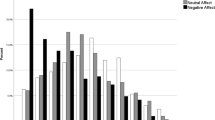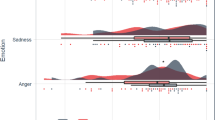Abstract
This study investigated the influence of positive affect on social categorization. Subjects in whom positive affect had been induced, and control subjects, were asked to indicate the degree to which good and weak examples of positive and negative person categories fit those categories. Positive-affect subjects rated weak exemplars of positive, but not of negative, trait categories as better members of the categories than did control subjects. Results are interpreted as consistent with a growing literature suggesting that positive affect may involve increased cognitive flexibility in the way people relate positive or neutral ideas to one another, and increased access to multiple meanings of nonnegative cognitive material.
Similar content being viewed by others
References
Andersen, S. M., & Klatzky, R. L. (1987). Traits and social stereotypes: Levels of categorization in person perception.Journal of Personality and Social Psychology 53, 235–246.
Boucher, J., & Osgood, C. E. (1969). The Pollyanna hypothesis.Journal of Verbal Learning and Verbal Behavior 8, 1–8.
Bousfield, W. A. (1944). An empirical study of the production of affectively toned items.Journal of General Psychology, 34 205–215.
Cantor, N., & Mischel, W. (1977). Traits as prototypes: Effects on recognition memory.Journal of Personality and Social Psychology, 35 38–48.
Cantor, N., & Mischel, W. (1979). Prototypes in person perception. In L. Berkowitz (Ed.),Advances in experimental social psychology. New York: Academic Press.
Cramer, P. (1968).Word association. New York: Academic Press.
Isen, A. M. (1984). Toward understanding the role of affect in cognition. In R. Wyer and T. Srull (Eds.),Handbook of social cognition. Hillsdale, NJ: Erlbaum.
Isen, A. M. (1987). Positive affect, cognitive processes, and social behavior. In L. Berkowitz (Ed.),Advances in experimental social psychology (Vol. 20). New York: Academic Press.
Isen, A. M., & Daubman, K. A. (1984). The influence of affect on categorization.Journal of Personality and Social Psychology, 47 1206–1217.
Isen, A. M., & Daubman, K. A., & Nowicki, G. P. (1987). Positive affect facilitates creative problem solving.Journal of Personality and Social Psychology, 52 1122–1131.
Isen, A. M. & Geva, N. (1987). The influence of positive affect on acceptable level of risk: The person with a large canoe has a large worry.Organizational Behavior and Human Decision Processes, 39 145–154.
Isen, A. M., Johnson, M. M. S., Mertz, E., & Robinson, G. F. (1985). The influence of positive affect on the unusualness of word associations.Journal of Personality and Social Psychology, 48 1413–1426.
Isen, A. M., & Means, B. (1983). The influence of positive affect on decision-making strategy.Social Cognition, 2 18–31.
Isen, A. M., Nygren, T. E., & Ashby, F. G., (1988). The influence of positive affect on the subjective utility of gains and losses: It is just not worth the risk.Journal of Personality and Social Psychology, 55 710–717.
Isen, A. M., Rosenzweig, A. S., & Young, M. J. (1991). The influence of positive affect on clinical problem solving.Medical Decision Making, 11 221–227.
Isen, A. M., & Shalker, T. E. (1982). Do you “accentuate the positive, eliminate the negative” when you are in a good mood?Social Psychology Quarterly, 45 58–63.
Isen, A. M., Shalker, T., Clark, M. S., & Karp, L. (1978). Affect, accessibility of material and behavior: A cognitive loop?Journal of Personality and Social Psychology, 36 1–12.
Isen, A. M., & Simmonds, S. (1978). The effect of feeling good on a helping task that is incompatible with good mood.Social Psychology Quarterly, 41 345–349.
Laird, J. D., Wagener, J. J., Halal, M., & Szegda, M. (1982). Remembering what you feel: The effects of emotion on memory.Journal of Personality and Social Psychology, 42 646–657.
Matlin, M. W., & Stang, D. (1979).The Polyanna Principle: Selectivity in language, memory and thought. Cambridge, MA: Schenkman.
Mischel, W. (1968).Personality and assessment. New York: Wiley.
Nasby, W., & Yando, R. (1982). Selective encoding and retrieval of affectively valent information.Journal of Personality and Social Psychology, 43 1244–1255.
Niedenthal, P. M., & Cantor, N. (1984). Making use of social prototypes: From fuzzy concepts to firm decisions.Fuzzy Sets and Systems, 14 5–27.
Niedenthal, P. M., & Cantor, N. (1986). Affective responses as guides to category-based inferences.Motivation and Emotion, 10 31–46.
Rosch, E. (1978). Principles of categorization. In E. Rosch and B. B. Lloyd (Eds.),Cognition and categorization. Hillsdale, NJ: Erlbaum.
Rosch, E., Mervis, C., Grey, W., Johnson, E., & Boyes-Bream, P. (1978). Basic objects in natural categories.Cognitive Psychology, 8 382–439.
Schiffenbauer, A. (1974). Effects of observer's emotional state on judgments of the emotional states of others.Journal of Personality and Social Psychology, 30 31–36.
Teasdale, J. D., & Fogarty, S. J. (1979). Differential effects of induced mood on retrieval of pleasant and unpleasant events from episodic memory.Journal of Abnormal Psychology, 88 248–257.
Teasdale, J. D., & Russell, M. L. (1983). Differential aspects of induced mood on the recall of positive, negative, and neutral words.British Journal of Clinical Psychology, 22 163–171.
White, M. M., & Powell, M. (1936). The differential reaction time for pleasant and unpleasant words.American Journal of Psychology, 48 126–133.
Author information
Authors and Affiliations
Additional information
This research was supported in part by grant BNS 8406352 from NSF to Alice M. Isen. Preparation of the manuscript was supported, in addition, by BRSG grant SO7 RR7041, awarded by the Biomedical Research Support Grant Program, Division of Research Resources, National Institutes of Health.
Rights and permissions
About this article
Cite this article
Isen, A.M., Niedenthal, P.M. & Cantor, N. An influence of positive affect on social categorization. Motiv Emot 16, 65–78 (1992). https://doi.org/10.1007/BF00996487
Issue Date:
DOI: https://doi.org/10.1007/BF00996487




